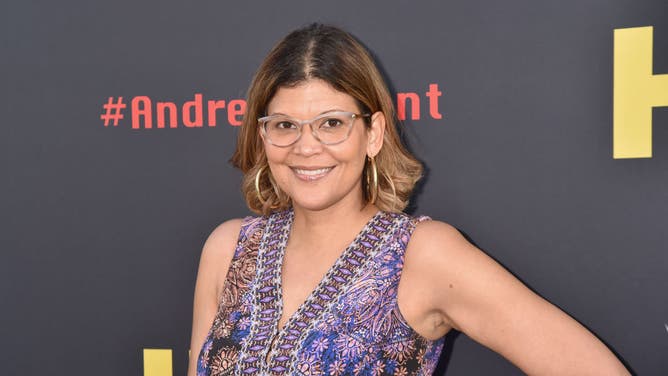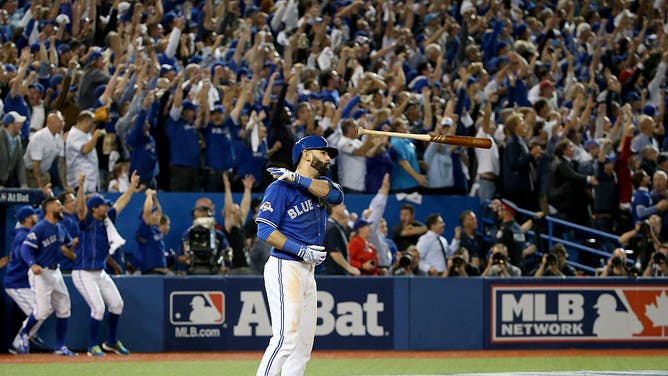ESPN, Ibram X. Kendi Documentary Says MLB Forces Latino Players To Learn 'White, American Style' Of Baseball
Previously, OutKick did reviews of the first, second and third episodes of "Skin in the Game," a five-part docu-series produced by ESPN and starring Ibram X. Kendi (formerly known as Henry Rogers).
If you missed those, you can catch up here.
Additionally, if you were fortunate enough to not even know that ESPN partnered with race-hustler Ibram X. Kendi (a.k.a. Henry Rogers) for this project, you can read all about it here.
I'll wait for you to eagerly catch up on all the great content where ESPN tells you that you're inherently racist just for being an American.

Ibram X. Kendi partnered with ESPN to produce "Skin in the Game," a five-part docu-series that explains why sports are racist. (Photo by Arturo Holmes/Getty Images for MVAAFF)
OK, now that all of that is out of the way, we can move on.
As I said in the review of episode one, I care deeply about the OutKick audience, so I watched the show. I know you don't want to do that -- and, frankly, I didn't either -- but at least I got paid to do it. Though, to be fair, not nearly enough.
With that, we move on to episode four...
"Highlights" from ESPN, Ibram Kendi's (a.k.a. Henry Rogers) fourth episode of "Skin in the Game"
Episode 4 title: "America's Pastime"
ESPN and Ibram X. Kendi decided to take a break from focusing only on black athletes and shift to Latino players in Major League Baseball for episode four. Thousands of Latin American baseball players dream of making it to the United States and playing in Major League Baseball.
Some of them flee from horrible situations. Yet, ESPN and Kendi make the claim that, you guessed it, the country is racist against them. Fascinating how many non-white people from around the world are willing to risk their lives to get into this horribly racist nation.
The episode begins with Kendi saying that people think Latin American players are bad for baseball. This is a classic straw man argument. Who is saying this?
In fact, I googled it. The only stories that come up are ones arguing that either MLB or America is racist and/or exploiting Latin American players.
Not one article suggesting that baseball is better with less Latino players. Not one.

David Ortiz, from the Dominican Republic, is one of the most beloved athletes in the United States of America. (Photo by Brian Fluharty/Getty Images)
Kendi lays out the idea that Latin American players are forced to "assimilate" into American culture when they get here.
Let me take a moment to get on my soapbox, if you'll indulge. I absolutely abhor the hypocrisy of this argument. And, unlike Kendi, I know that people make this case ALL THE TIME. Google "assimilation Washington Post" or "assimilation New York Times" and you'll see what I mean.
These "journalists" make the argument that it's wrong to think immigrants to this country should try to fit in with the American culture. Fine, I'm not going to argue that (even though I might disagree).
But imagine for a moment that an American said something like, "I moved to Brazil and none of them spoke English! They need to respect my American heritage!"
Can you fathom the outcry if someone said that? "That's their country! You have no right to go there and demand they adhere to your cultural norms!"
Hmm. Seems like you might apply that logic in reverse, too? But, no. Racism is a one-way street, as we know.
Kendi's commentary exposes his racism
This is how you know that all these "antiracists" are really just racists. Here's what they're actually saying: if people immigrate to America, they don't have to learn the language or the customs. And we need to accept that. Why? Because we're America. We're better. Plus, they don't know any better.
Those countries, though? You can't expect them to have the same standard that we have in the United States.
It's funny, all the people that shout the loudest about how horrible the US is sure hold the country to a very high standard. You'd think they wouldn't. After all, what do you expect from racist America? Right?
The next voice we hear in the episode is Aida Rodriguez, who's fonted as "comedian." I can't believe they included her sound bite, quite honestly.
"Assimilation is a very touchy topic when it comes to Latinos because many of them see it as a positive thing," Rodriguez begins. "They're like 'we're here, we're in America, what's wrong with being an American?'"

Aida Rodriguez attends the Los Angeles Premiere of Andre The Giant from HBO Documentaries in 2018. (Photo by Jeff Kravitz/FilmMagic for HBO)
Great question. What is wrong with being an American? You left your home country presumably to live a better life than the one you had. If I did that, I'd never stop celebrating my new land for providing that opportunity. Fortunately, I was lucky enough to be born in the United States. I don't have to leave for a better life.
Credit to those Latinos who want to be Americans. Although, it's sad that many immigrants are more "Proud to be an American" than thousand, if not millions, of natural citizens.
ESPN documentary "Skin in the Game" and host Ibram X. Kendi (a.k.a. Henry Rogers) explain that it's racist for baseball to have "unwritten cultural rules"
Mostly, this applies to things like bat flips and excessive celebration. Which, by the way, divides a lot of fans and is a constant debate. Some like it, some don't. That's fine. This is America. People are entitled to their personal opinions.
But those who don't like it? Well, they're racist! They're not respecting Latinos cultural affinity for ... bat flips?
"The unwritten rules are an invisible doctrine that pressures all players to conform to a white-American style of playing the game," Kendi says. "The unwritten rules essentially tell the Latino players that the language they speak, the way they play the game, needs to change."
First of all, Latin Americans did not invent celebration. Plenty of white baseball players have gotten a "pitch in the earhole" for "breaking the unwritten rules." That is part of baseball, yes. Making it a "white" thing is an inherently racist, though. Then again, Kendi has a lot of inherently racist thoughts.

Fourth episode of "Skin in the Game," an ESPN series starring Ibram X. Kendi, a.k.a. Henry Rogers, focuses heavily on bat flips like the famous one by Jose Bautista. (Photo by Tom Szczerbowski/Getty Images)
Bob Gibson, one of the greatest pitchers ever and a black man, openly talked about throwing at hitters. He threw a "brushback pitch with attitude." Should we call throwing at hitters a black-American style of playing the game? Well, no, that would be racist. So, too, would telling Gibson not to throw at hitters, apparently. We have to respect his cultural norms, right?
The episode continues with a history lesson about assimilation practices in the early 1900s. Like in previous episodes, Kendi has to rely on things from well in the past because the issues don't really exist today.
To Kendi and ESPN's credit, they do include multiple soundbites -- like the one above from Rodriguez -- that say that some of the assimilation practices are actually a good thing.
I found this comical, though. I'm now on the fourth episode of this show. The first three episodes focused entirely on black athletes. There was NOT ONE mention of anything positive. Everything was about how horrible white people and America is to black people.
Yet, here we are talking about Latinos, and suddenly some of it wasn't all that bad. See, Kendi needs to remind you that even though Latinos might face some racism, it's not as bad as what black people endure.
Gotta keep that victim hierarchy in tact!
Miguel Vargas appears in ESPN documentary "Skin in the Game" with host Ibram X. Kendi (a.k.a. Henry Rogers) to explain that not speaking English made life difficult
Vargas, a 23-year-old Dodgers player, joins the show to explain the difficulty he faced when he came to America to play minor league baseball. No one in Michigan and Utah, where he played, spoke Spanish. That made it tough for him to do things like order food from restaurants.
Although, the documentary quickly mentions and moves on from the fact that he came to the US from CUBA. Yes, the horrors of not being able able to order in an American restaurant must be quite comparable to living under the oppressive thumb of a communist dictator.
I understand it's difficult to move to a new country not knowing the language. That's not unique to immigrating to the United States. If I moved to the aforementioned Brazil, I'd have to learn Portuguese.

Miguel Vargas of the Los Angeles Dodgers appears in the fourth episode of "Skin in the Game," an ESPN series starring Ibram X. Kendi, a.k.a. Henry Rogers. (Photo by Jayne Kamin-Oncea/Getty Images)
After the Rojas story, the episode continues with the usual panel discussion. This one includes former MLB player Eduardo Pérez, professor Adrian Burgos, Jr., and journalist Jesus Ortiz. Again, I lifted their titles from the ESPN press release.
Once again, they continue the theme of the episode. There's nothing worth delving into that I didn't already cover.
Good news, bad news. The good news is that there's only one episode left for me to watch and disseminate to the OutKick readers.
The bad news is that there's still one more episode for me to watch and disseminate to the OutKick readers.
Wish me luck and check back for the final episode review of ESPN's "Skin in the Game" featuring Ibram X. Kendi (a.k.a. Henry Rogers)!